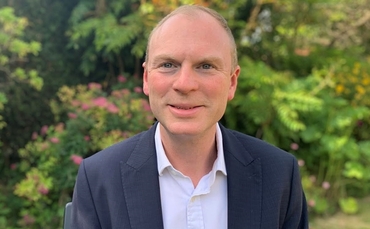

Offshore wind must be delivered in a way that protects biodiversity, supports communities and grows green industries, writes the Crown Estate's Gus Jaspert
When I stand on my local beach in West Sussex the sea looks like a vast space. But, beneath the surface, lies an ever increasingly crowded seabed which provides vital energy and resources for our country and a rich - but under pressure - natural environment.
That's why I was delighted to join The Crown Estate last autumn, where, as managers of the seabed, we are at the frontline of helping tackle some of the greatest challenges of our time - climate change, biodiversity loss and energy security.
The seabed and waters around the UK underpin an extraordinary number of livelihoods and a wide range of industries; ports and shipping enable trade, marine aggregates provide building materials, subsea cables connect us to European energy markets, telecommunications cables drive the digital economy and renewable energy projects help build energy security and tackle the climate challenge.
For The Crown Estate, creating lasting and shared prosperity for the nation means supporting these multiple priorities to thrive. It does this by collaborating closely with the many users of the seabed to take a coordinated approach to its management. The organisation invests in, and publicly shares, vast amounts of data, research and insights to support evidence-led decision-making, which drives the design of the seabed leasing process and enables these vital industries to develop in a way which is considerate of marine biodiversity and the other users of the sea.
Over the last 25 years, The Crown Estate has played a major role in bringing forward the UK's offshore wind industry, which is one of the biggest offshore wind energy generators in the world, with the same amount of operational offshore wind capacity as the whole of the EU. This January, through Offshore Wind Leasing Round 4, rights were awarded to 8GW of new offshore wind projects - enough to power seven million homes - taking the amount of seabed rights awarded for offshore wind up to 41GW. This growth has been remarkable.
The Crown Estate is ready to rise to the challenges of the coming decade, knowing well that what has worked to this point won't be enough on its own. The organisation needs achieve more in its renewable energy transition in the next ten years than we have in the last 25. And crucially, as The Crown Estate unlocks the sea's potential, it must continue to protect and nurture its incredible biodiversity, which is why I am so pleased it has placed nature at the heart of our strategy. To deliver the seabed's full potential will require intense collaboration, innovation and new technology, data and evidence, and a joint plan for how The Crown Estate, with its partners, can orchestrate the intricate jigsaw of competing seabed demands.
The Crown Estate will continue to support offshore wind as it innovates into deeper waters and is currently working on plans to launch a leasing opportunity for floating wind which includes giving developers the option to incorporate innovations such as green hydrogen production into their projects. Catalysing the economic benefits of these transformative industries for local communities by stimulating private sector support for jobs, skills and infrastructure is critical to the organisation's purpose.
The Crown Estate is also focussed on supporting the growth of other vital industries. Initiatives like the Offshore Wind and Carbon Capture, Utilisation and Storage (CCUS) Co-location Forum, for instance, bring together representatives of these sectors to find ways of deploying these technologies simultaneously.
Using its unique position and ability to take a long-term view, The Crown Estate is planning to lead the creation of an innovative seabed roadmap which will present potential outcomes for the seas of England, Wales and Northern Ireland. This will enable it to jointly plan, with partners, the route to achieve net zero, energy security and biodiversity growth - from our leasing rounds, to protecting nature, to grid connections, to how industry can develop in a sustainable way.
And the Crown Estate will invest more in data and evidence than ever before through our Offshore Wind Evidence and Change Programme - so that it can get ahead of challenges and partner with others to overcome these. World leading digital tools will enable planning for the future -the Crown Estate's Marine Data Exchange is already the world's largest marine data source, driving evidence-led decision-making.
As the pressures on the seabed increase, the challenge of ensuring it can flourish as both an economic and a natural resource will become increasingly complex. How we respond to this is my number one priority. The Crown Estate already has great foundations to build upon, pioneering new collaborative approaches and shaping activity for the long-term benefit of the nation. In the months and years ahead we will redouble those efforts to ensure our collective ambitions can be met in full.
Now, when I stand on my Sussex beach I don't just admire the beauty of the sea, I am inspired about what we can achieve for the nation with what lies beneath.
Gus Jaspert is managing director of marine at The Crown Estate
* This article was originally published here
Comments
Post a Comment